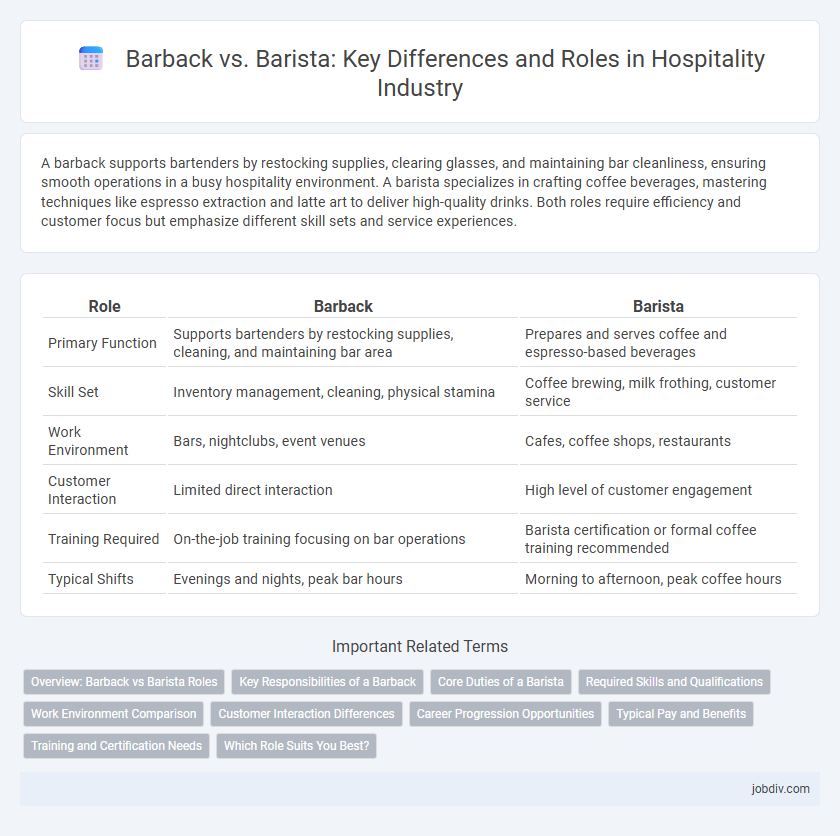A barback supports bartenders by restocking supplies, clearing glasses, and maintaining bar cleanliness, ensuring smooth operations in a busy hospitality environment. A barista specializes in crafting coffee beverages, mastering techniques like espresso extraction and latte art to deliver high-quality drinks. Both roles require efficiency and customer focus but emphasize different skill sets and service experiences.
Table of Comparison
| Role | Barback | Barista |
|---|---|---|
| Primary Function | Supports bartenders by restocking supplies, cleaning, and maintaining bar area | Prepares and serves coffee and espresso-based beverages |
| Skill Set | Inventory management, cleaning, physical stamina | Coffee brewing, milk frothing, customer service |
| Work Environment | Bars, nightclubs, event venues | Cafes, coffee shops, restaurants |
| Customer Interaction | Limited direct interaction | High level of customer engagement |
| Training Required | On-the-job training focusing on bar operations | Barista certification or formal coffee training recommended |
| Typical Shifts | Evenings and nights, peak bar hours | Morning to afternoon, peak coffee hours |
Overview: Barback vs Barista Roles
Barbacks support bartenders by restocking supplies, cleaning bar areas, and ensuring smooth drink preparation during busy shifts, while baristas specialize in crafting coffee beverages with expertise in espresso machines and latte art. Barbacks work primarily in nightlife venues like bars and clubs, whereas baristas operate in coffee shops and cafes, focusing on customer service and beverage quality. Both roles require multitasking and efficiency but differ fundamentally in their skill sets and work environments within the hospitality industry.
Key Responsibilities of a Barback
Barbacks play a crucial role in the hospitality industry by supporting bartenders through maintaining bar cleanliness, restocking supplies, and ensuring glassware is readily available. Their key responsibilities include assisting with inventory management, prepping garnishes, and promptly clearing empty bottles to maintain efficient bar service. Unlike baristas who specialize in coffee preparation, barbacks focus primarily on facilitating smooth cocktail service and seamless bar operations.
Core Duties of a Barista
A barista primarily specializes in preparing and serving coffee beverages, expertly operating espresso machines and grinders to ensure high-quality drinks. Their core duties include crafting espresso-based drinks, steaming milk with precision, and maintaining cleanliness and organization at the coffee station. Unlike barbacks who support bartenders by restocking and cleaning, baristas focus on beverage preparation and customer interaction within a cafe or coffeehouse setting.
Required Skills and Qualifications
Barbacks require physical stamina, knowledge of bar equipment, and the ability to multitask in a fast-paced environment to support bartenders efficiently. Baristas must possess expertise in coffee brewing techniques, customer service skills, and knowledge of different coffee beans and machines to craft high-quality beverages. Both roles benefit from strong communication skills and the ability to maintain cleanliness and organization in their respective workstations.
Work Environment Comparison
Barbacks typically work in fast-paced nightlife settings such as bars, clubs, and events, assisting bartenders by restocking supplies and maintaining cleanliness to ensure smooth service. Baristas operate mainly in cafes or coffee shops, focusing on crafting espresso-based beverages and creating a welcoming atmosphere during daytime hours. The barback role demands physical stamina for long shifts and heavy lifting, while baristas often engage more with customers in quieter, more controlled environments.
Customer Interaction Differences
Barbacks primarily support bartenders by restocking supplies and maintaining cleanliness, resulting in limited direct customer interaction compared to baristas who engage with customers by taking orders, preparing beverages, and providing personalized service. Baristas often build rapport and respond to individual preferences, enhancing the customer's experience through interactive communication. In contrast, barbacks' roles are more behind-the-scenes, focusing on operational efficiency rather than customer engagement.
Career Progression Opportunities
Barbacks support bartenders by replenishing supplies and maintaining bar cleanliness, providing foundational skills for a bartending career. Baristas develop expertise in coffee preparation and customer service, often progressing to roles like shift supervisor or cafe manager. Both roles offer distinct career paths, with barbacks advancing within nightlife and bar operations, while baristas grow in specialty coffee and cafe management sectors.
Typical Pay and Benefits
Barbacks typically earn an hourly wage ranging from $10 to $15, often with tips that supplement their income, while baristas usually make between $12 and $18 per hour depending on experience and location. Barbacks benefit from on-the-job training and potential advancement to bartender roles, whereas baristas often receive health insurance, employee discounts, and paid time off as part of their benefits package. Both roles experience variability in pay and benefits based on establishment type, geographic location, and employer policies in the hospitality industry.
Training and Certification Needs
Barbacks typically require on-the-job training emphasizing efficiency in restocking and supporting bartenders, with certifications like TIPS or alcohol awareness enhancing their qualifications. Baristas undergo specialized barista training programs focused on coffee preparation techniques, espresso machine operation, and customer service, often complemented by certifications from organizations such as the Specialty Coffee Association (SCA). Both roles benefit from food safety and hygiene certifications, but baristas usually require more formal education related to beverage artistry and machine maintenance.
Which Role Suits You Best?
Barbacks support bartenders by restocking supplies and maintaining cleanliness, ideal for those who thrive in fast-paced environments and enjoy behind-the-scenes work. Baristas focus on crafting specialty coffee and engaging with customers, perfect for individuals passionate about coffee culture and customer interaction. Choosing between barback and barista roles depends on your preference for either dynamic bar operations or creative beverage preparation.
Barback vs Barista Infographic

 jobdiv.com
jobdiv.com